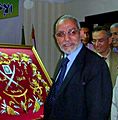Muslim Brotherhood facts for kids
Quick facts for kids
Society of the Muslim Brothers
جماعة الإخوان المسلمين
|
|
|---|---|
| Leader | Mohammed Badie |
| Spokesperson | Gehad El-Haddad |
| Founder | Hassan al-Banna |
| Founded | 22 March 1928 Ismailia, Kingdom of Egypt |
| Headquarters | Cairo, Egypt (historical) Unclear (present) |
| Ideology | Pan-Islamism Sunni Islamism Neo-Sufism Qutbism Religious conservatism Salafism Anti-imperialism Social conservatism Anti-Zionism Anti-communism |
| Political position | Right-wing |
The Society of the Muslim Brothers, often called the Muslim Brotherhood, is a large organization that started in Egypt. It was founded in 1928 by a teacher named Hassan al-Banna. His ideas spread widely, influencing many groups today.
Contents
What is the Muslim Brotherhood?
The Muslim Brotherhood is a Sunni Islamist group. This means their beliefs are based on Sunni Islam. When they first started, they focused on teaching people about Islam. They also helped those who couldn't read and set up hospitals. They even started businesses to help their communities.
Goals and Beliefs
The group's main goal was to create a society based on sharia law. This is a set of rules and principles from Islamic traditions. They also wanted to end British control over Egypt. Their famous saying is "Islam is the solution." Helping people through charity has always been a big part of their work.
Growth and Challenges
The Muslim Brotherhood grew and spread to other Muslim countries. However, they faced many challenges in Egypt. The government often tried to stop them, starting in 1948. For a long time, they were not a major political force in the Arab World.
After the Six-Day War in 1967, many people in Arab countries felt disappointed. This led to a rise in support for Islamic groups like the Brotherhood. They also received support from countries like Saudi Arabia.
The Arab Spring and Politics
The Arab Spring was a series of protests and changes in the Middle East. During this time, the Muslim Brotherhood became legal in Egypt in 2011. They won several elections, and in 2012, their candidate Mohamed Morsi became Egypt's first elected president.
However, a year later, there were huge protests against him. The military then removed him from power in 2013. After this, the group was banned in Egypt. Some countries, like Saudi Arabia and the United Arab Emirates, also saw the Brotherhood as a threat. They declared it a terrorist organization.
Views on Violence
Historically, some members of the Brotherhood used violence. For example, there were attacks on Egyptian leaders in the past. One of their thinkers, Sayyid Qutb, wrote ideas that inspired some extreme groups. These ideas suggested that violence could be used to create a perfect Islamic society.
However, the group officially stopped using violence in the 1970s. They now say they are a peaceful and democratic organization. Still, a group called Hamas, which controls the Gaza Strip, is connected to the Brotherhood and continues to use violence.
As of 2015, several governments consider the Muslim Brotherhood a terrorist organization. These include Bahrain, Egypt, Russia, Syria, Saudi Arabia, and the United Arab Emirates.
Images for kids
-
Muslim Brotherhood fighters in the 1948 Arab–Israeli War
-
Then-U.S. Secretary of State John Kerry meeting with then-Egyptian President Mohamed Morsi, May 2013
See also
 In Spanish: Hermanos Musulmanes para niños
In Spanish: Hermanos Musulmanes para niños
- Politics of Egypt
- Islamism
 | Leon Lynch |
 | Milton P. Webster |
 | Ferdinand Smith |






